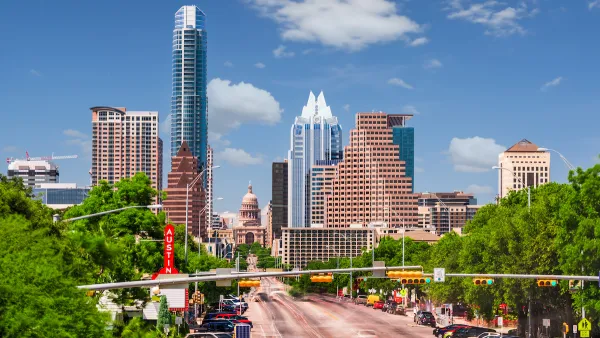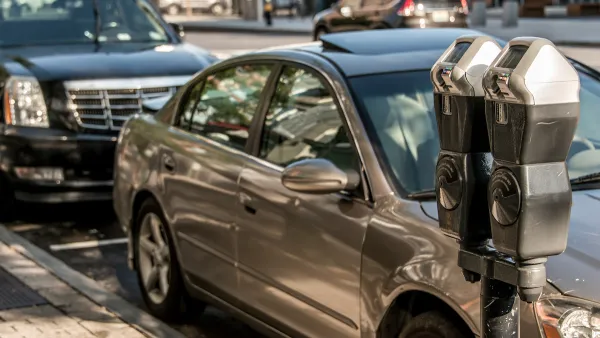The energy capital of America sees money in them thar autos - in parking them, that is. Tapping motorists for parking bears some similarity to tapping shale basins for oil - without the fracking. Sightline's Alan Durning writes about the resemblance.
Houston is getting noticed more often by city planners for their progressive practices, such as recent efforts to make it "denser and more livable", and Mayor Annise Parker's initiative "to make Houston's streets accessible to everyone, and that includes walkers, cyclists, and people who use mobility devices". Add parking reform to the list of planning issues that one might not expect to see in Houston.
A three-mile strip of Houston’s Washington Avenue, plus a block or two on each side of it, has recently become the city’s first “parking benefit district.” Meters have sprouted along this corridor like oil derricks in the West Texas sun.
Parking benefit districts were promoted in 2003 (PDF) by UCLA Professor Don Shoup and colleague Douglas Kolozsvari as a means for businesses or residences to directly benefit from the meters placed on their blocks, as opposed to having all the parking revenues sent to municipal governments to shore up general funds.
Continuing with the energy analogy, Durning writes that these parking meters are "extracting a steady stream of dollars and cents, and the pipeline of cash flows first to the city to cover the costs of the program and then to a community chest controlled by a local board of residents and business owners." According to the city's webpage (PDF), parking benefit district revenues are used to "finance improvements that enhance the quality of life and promote walking, cycling, and the use of public transportation."
Durning writes that annual revenues are "projected at $170,000 a year" and are expected to "enhance local property values even as the curb pricing will fix parking congestion."
So - what of the conventional practice of sending meter revenue to the city coffers as opposed to the business and neighborhood districts? Durning writes that it "might as well be going to Mars. It has virtually no political salience for most voters."
Houston is not the first Texas city to enact parking benefit districts. The Metropolitan Planning Council's Chrissy Mancini Nichols and MPC Research Assistant Parfait Gasana wrote in June how "how parking benefit districts revitalized Austin, Texas."
Alan Durning, executive director of Sightline, also writes about "parking wars" in Seattle and Portland in this article.
FULL STORY: Curb Appeal

Analysis: Cybertruck Fatality Rate Far Exceeds That of Ford Pinto
The Tesla Cybertruck was recalled seven times last year.

National Parks Layoffs Will Cause Communities to Lose Billions
Thousands of essential park workers were laid off this week, just before the busy spring break season.

Retro-silient?: America’s First “Eco-burb,” The Woodlands Turns 50
A master-planned community north of Houston offers lessons on green infrastructure and resilient design, but falls short of its founder’s lofty affordability and walkability goals.

Test News Post 1
This is a summary

Analysis: Cybertruck Fatality Rate Far Exceeds That of Ford Pinto
The Tesla Cybertruck was recalled seven times last year.

Test News Headline 46
Test for the image on the front page.
Urban Design for Planners 1: Software Tools
This six-course series explores essential urban design concepts using open source software and equips planners with the tools they need to participate fully in the urban design process.
Planning for Universal Design
Learn the tools for implementing Universal Design in planning regulations.
EMC Planning Group, Inc.
Planetizen
Planetizen
Mpact (formerly Rail~Volution)
Great Falls Development Authority, Inc.
HUDs Office of Policy Development and Research
NYU Wagner Graduate School of Public Service




























